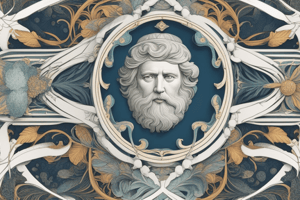Podcast
Questions and Answers
What concept did Democritus and Leucippus introduce about matter?
What concept did Democritus and Leucippus introduce about matter?
- Matter changes form based on environmental conditions.
- Matter is composed of continuous substances.
- Matter can be infinitely divided.
- Matter is made up of tiny, indivisible particles called atoms. (correct)
According to early Greek scholars, what does the term 'ATOMOS' signify?
According to early Greek scholars, what does the term 'ATOMOS' signify?
- Unchangeable
- Uncuttable (correct)
- Indestructible
- Divisible
Which philosopher proposed the theory of 'everything-in-everything'?
Which philosopher proposed the theory of 'everything-in-everything'?
- Democritus
- Empedocles
- Anaxagoras (correct)
- Heraclitus
What did Empedocles claim all matter consists of?
What did Empedocles claim all matter consists of?
How did early Greek philosophers view atoms in terms of their physical properties?
How did early Greek philosophers view atoms in terms of their physical properties?
What was a key belief of Aristotle regarding matter?
What was a key belief of Aristotle regarding matter?
Which characteristic was NOT attributed to atoms by Democritus and Leucippus?
Which characteristic was NOT attributed to atoms by Democritus and Leucippus?
What concept did Anaximenes contribute regarding matter?
What concept did Anaximenes contribute regarding matter?
What did Paracelsus believe was necessary to maintain health?
What did Paracelsus believe was necessary to maintain health?
Which atomic model suggested that atoms were composed of a positively charged matrix with embedded electrons?
Which atomic model suggested that atoms were composed of a positively charged matrix with embedded electrons?
Who developed the Planetary Model of the atom?
Who developed the Planetary Model of the atom?
In which year was the Solid Sphere Model proposed by John Dalton?
In which year was the Solid Sphere Model proposed by John Dalton?
What important particle did Ernest Rutherford discover in 1919?
What important particle did Ernest Rutherford discover in 1919?
Which philosopher believed that air is the fundamental substance from which all things originate?
Which philosopher believed that air is the fundamental substance from which all things originate?
What did Heraclitus argue about the nature of reality?
What did Heraclitus argue about the nature of reality?
What is the Greek word for 'element' that means the smallest division?
What is the Greek word for 'element' that means the smallest division?
Which of the following was NOT one of the four classical elements according to Aristotle?
Which of the following was NOT one of the four classical elements according to Aristotle?
Who first proposed the idea of the 'roots' as primordial substances?
Who first proposed the idea of the 'roots' as primordial substances?
What was the primary goal of alchemy in its historical context?
What was the primary goal of alchemy in its historical context?
Which of the following contributions is attributed to Indian alchemists?
Which of the following contributions is attributed to Indian alchemists?
What did Aristotle describe air as having in terms of its qualities?
What did Aristotle describe air as having in terms of its qualities?
Study Notes
Early Ideas About Matter
- Ancient Greek philosophers believed the universe was a single entity.
- Democritus and Leucippus proposed the idea of atoms: tiny, indivisible particles.
- The word "atom" comes from Greek "atomos," meaning "uncutterable."
- Democritus believed atoms were solid, homogeneous, and came in different shapes and sizes.
- Aristotle proposed that everything was made up of four elements: air, fire, water, and earth.
Arguments Against Atomism
- Anaxagoras proposed that everything was composed of small particles he called "nous."
- Anaximenes believed air was the fundamental substance from which all things originated.
- Heraclitus believed fire was the primeval substance, and change was the only reality.
- Aristotle argued that the existence of atoms would restrict the power of the gods.
Early Ideas About Elements
- Thales believed water was the fundamental substance.
- Xenophanes believed earth was the fundamental substance.
- Empedocles proposed that all four elements (air, fire, water, and earth) were the primordial substances.
- The word "element" comes from the Greek word "stoicheion," meaning smallest division.
- Plato used the term "element" to describe the smallest division of matter.
Contributions of Alchemists
- Alchemy was a protoscientific tradition focused on finding the elixir of life and the philosopher's stone.
- Asian alchemists made significant contributions, including isolation of metallic zinc, invention of steel, use of fire to identify metals, and creation of gunpowder and poisons.
- Islamic alchemists like Jabir Ibn Hayyan described laboratory techniques and mentioned substances such as silver nitrate and red oxide of mercury.
- Egyptian alchemists created imitation gold and silver, fabricated pearls, and made dyes and artificial gemstones.
- European alchemist Paracelsus believed that the body worked alchemically and proposed three essentials (salt, mercury, and sulfur) for maintaining health.
Discovery of the Structure of the Atom
- John Dalton proposed the first atomic model in 1808, the Solid Sphere Model.
- Dalton believed atoms were solid spheres that could not be divided into smaller particles.
- Joseph John Thomson's Plum Pudding Model, developed in 1897, suggested a positively charged matrix with embedded electrons.
- Thomson discovered the electron in 1904.
- Ernest Rutherford's Nuclear Model (1911) proposed a small, dense, positively charged nucleus at an atom's center.
- Rutherford discovered the proton in 1919.
- Niels Bohr’s Planetary Model (1913) proposed that electrons orbited the nucleus at different distances with different energies, explaining the colors of light emitted.
Studying That Suits You
Use AI to generate personalized quizzes and flashcards to suit your learning preferences.
Related Documents
Description
Explore the early ideas about matter presented by ancient philosophers, including atomism and elemental theories. This quiz covers significant contributions from figures like Democritus, Aristotle, and Empedocles. Test your understanding of their concepts and arguments regarding the fundamental substances of the universe.



